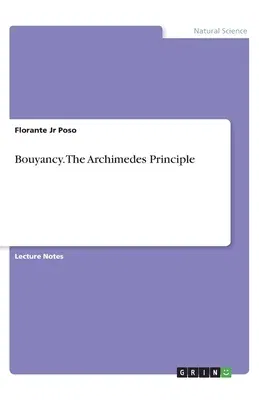Lecture Notes from the year 2015 in the subject Physics - Other, grade:
1.0, course: Civil Engineering, language: English, abstract: The eBook
discusses the Archimedes principle of buoyancy and the buoyancy equation
in general. Application to the field of engineering was also expounded
in order to show the relevance of the principle in the engineering
context. Sample problems are presented to understand fully the
application of the buoyancy principle of Archimedes. Analysis of whether
a certain object will float or sink are then explained based on the
buoyancy equation. Therefore stability of objects can be analyzed by
applying the mentioned principle. The principle of buoyancy can be
applied in floating objects such as ships and boats, submarines,
hydrometer, balloons and airships and so many other real-life
applications. "A buoyant force is defined as an upward force (with
respect to gravity) on a body that is totally or partially submerged in
fluid, either a liquid or gas. Buoyant forces are caused by the
hydrostatic pressure distribution." "When a solid object is wholly or
partly immersed in a fluid, the fluid molecules are continually striking
the submerged surface of the object. The forces due to these impacts can
be combined into a single force, the buoyant force." "The buoyant force,
which always opposes gravity, is nevertheless caused by gravity. Fluid
pressure increases with depth because of the (gravitational) weight of
the fluid above. This increasing pressure applies a force on a submerged
object that increases with depth. The result is buoyancy."


